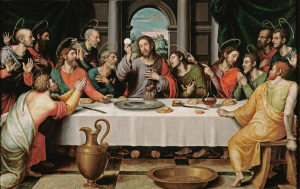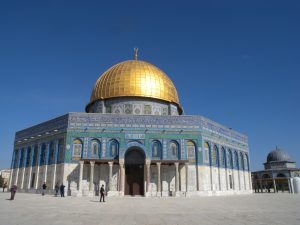HOMILY EASTER SEASON SUNDAY 6 C
Bonded Together in Intimate Love
(Acts 15:1-2, 22-29; Psalm 67; Rev 21:10-14, 22-23; John 14:23-29)
******************************************************************
In the movie, Of God and Men, a community of Trappist monks in Algeria are caught between the army and the rebels because they offer medical assistance to both sides without discrimination. As their situation becomes more precarious, they are torn between leaving for a safer location, or staying in solidarity with the local people who are suffering from the civil war that is raging.
In a serious meeting after their provincial superior arrives, they one by one make the decision to stay and not desert the people. That night, aware of the mounting tension around them, and with the premonition that this could be their last night together, they have a meal that evokes the scene of the Last Supper. The soft lighting, quiet music, fine wine and intimate conversation in the filming of that scene makes it especially poignant.
What stands out the most, however, is the love flowing between each member of the community. That love is palpable, visible, emanating from the screen to the viewer. One almost wishes one could have been there. As it turns out, that night they are rounded up and taken away in trucks, only to be marched into oblivion in a snowstorm, by either the army or the rebels (which one is not clear). As sobering as that scene is which ends the film, one is left with the more powerful image of that last loving meal.
Today’s Gospel evokes much the same emotions as the meal in that film. This passage is part of the Farewell Discourse of Jesus as he shares a last meal with his disciples. One can picture the soft lighting, perhaps even some quiet music, certainly the attentive disciples hanging on to every word Jesus speaks, quietly, intimately, perhaps in a halting voice. There is so much Jesus wants to communicate with his disciples as his ministry among them ends. The love between Jesus and his disciples most certainly is palpable and felt.
He proclaims those who love him keep his Word, and because he is one with the Father, his Word is also the Word of the Father. The Father and he will dwell in the hearts of those who believe, who love him and keep his Word. He allows them to see into the heart of God who is Trinity, family, relationship, intimacy – Father, Son and the Spirit that is the bond of love between the Father and the Son.
Jesus promises his disciples the gift of peace and serenity. This peace is so much more than fleeting feelings or emotions – it is a gift of the Spirit no one else can give them, and no one can take away from them. With that promise he encourages them to let go of any fear. Perfect love casts out all fear. Jesus and the Father have loved them perfectly. In the end, he promises he will return to be reunited with them, leaving them also with the profound gift of hope.

The Last Supper by Juan de Juanes
What Jesus shared with his disciples that night, and lived out for them the next day on the cross, he wants to share with us in this liturgy, and at all times. We are asked to love him, to keep his Word, to be open to the gift of the Spirit, and to surrender our will and lives over to him who has loved us totally, and to the end. We are to be his friends and followers. He wants to be bonded with him in love; to have an intimate, close relationship with us of tender love and trusting prayer.
That intimate relationship with Jesus and openness to the Spirit of Jesus was very evident in the early Church. In the first reading from the Acts of the Apostles, we see that there was a problem of Church discipline in the churches of Antioch, Syria and Cilicia, caused by Judean Jewish believers who wanted to impose circumcision on them. Paul and Barnabas travelled to Jerusalem to consult the elders there. These elders made a decision, inspired by and guided by the Holy Spirit, not to impose circumcision on the Gentiles.
This was a critical decision and a major turning point for the Pauline church communities, as it superseded the Law of Moses that had been strictly upheld by the Jewish religious leadership for thousands of years. The decision made with the Holy Spirit is especially significant for our separated Protestant cousins who try to live by faith and scripture alone. The early Church did not have any New Testament scriptures to consult, as nothing was written yet. The scripture they did have was the Torah, the Law of Moses the apostles felt free to transcend with the guidance of the Holy Spirit. To claim to live by scripture alone, then, is a false premise as that was not the way of the early Christian community.
What is highlighted in this passage is the role the Holy Spirit played at that time, influencing the apostles in their task of making decisions leading to the Tradition of the Church. This is the pattern within the Church to this day – seeking always to balance the Written Word of God (scripture) with the lived Word of God (Tradition).
What St. John provides in the second reading from the book of Revelation is almost like another movie. This is a theophany for John on a high mountain, an encounter with God. He has a vision of Jerusalem descending from heaven. It has 12 gates for the 12 tribes; 3 on each side, a perfect balance and symbol of a united Church. The foundation stones are the 12 apostles of the Lord. The Father and the Son are both the Temple and the light, so there is no need for a Temple or for light.
This revelation reminds us of Jesus’ words in the Temple when he remarked to the Jewish leaders, “Destroy this Temple and in three days I will raise it up.” He was, of course, speaking about the Temple of his Body. It is to this Temple that the reading also refers.
It is interesting that in the Old City of Jerusalem, in the remains of the Cardo or the main street, there is a mosaic map of Jerusalem that makes no mention and has no depiction of the Temple. For the early Christians, the Temple was not important, and the destruction of the Temple was also seen as perhaps divine justice.

Dome of the Rock on the Temple Mount
The early Christians were much more interested in the other holy sites – where Jesus was born; where he grew up; where he preached and performed miracles in Galilee, and the sites of his Passion, death and resurrection in the Holy Sepulchre. In fact, one tour guide insisted this neglect of the Temple mount by the Christian community at that time, actually using it as a garbage dump, was a sign of early anti-Semitism by the Christian community. Unfortunately, that neglect enabled a Muslim Caliph to build the Dome of the Rock and the famous gigantic Al-Asqua mosque on the site, which remains to this day, to the vexation of the Jews in Jerusalem.
So, what are we to make of all this? It is obvious that Jesus wants to be united with us in an intimate relationship of love in prayer; that we be open to the delicate movement of the Holy Spirit within us, and that we be, like him, temples of the Holy Spirit, disciples in whom the Father, Son and Holy Spirit both dwell and inspire.
The Eucharist is our heavenly food, an encounter with God as Father, Son and Holy Spirit, an agape or love meal, empowering us to go out and spread the Good News that God truly does dwell in us, and wants to be in an intimate loving relationship with all who believe in his Son Jesus.




Basically , Jesus is telling us to follow his word while building this intimate with him by trusting him and being open to accept him. We can be closer to him through prayers and communicating with him in our private moments . As long as we keep him alive and present that his spirit is with in us while continue our daily living. It can be working, doing chores and activities he is still with us and protecting us. The Last Supper is the last meal that is full of love and compassion when we receive the communion during mass. We should already know that Jesus is present inside the Eucharist when receive him. We can experience his love, mercy and compassion that is filling our hearts and minds. We tend to spend our time praying during this moment and ask him any thing. Lastly, we are to keep loving one another as we love ourselves because Jesus loves us . He will lead us to the gates of heaven while being his followers and missionary disciples or evangelists. Amen. Amen.
Thanks Bishop Sylvain for the wonderful homilies with many lessons and teachings . Hopefully we are hearing the word of God and living out the word. I agree with all the teachings and readings throughout this week. ????✝